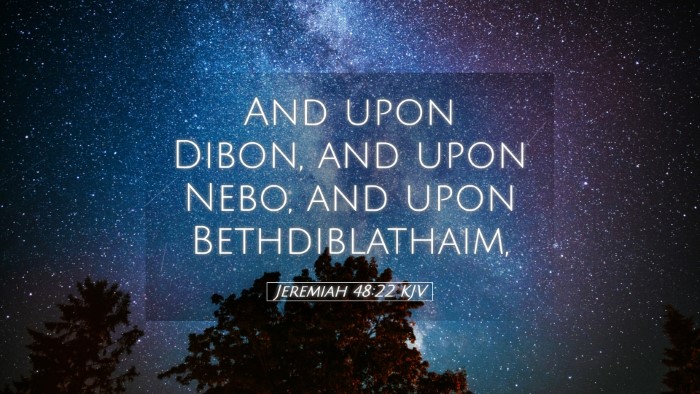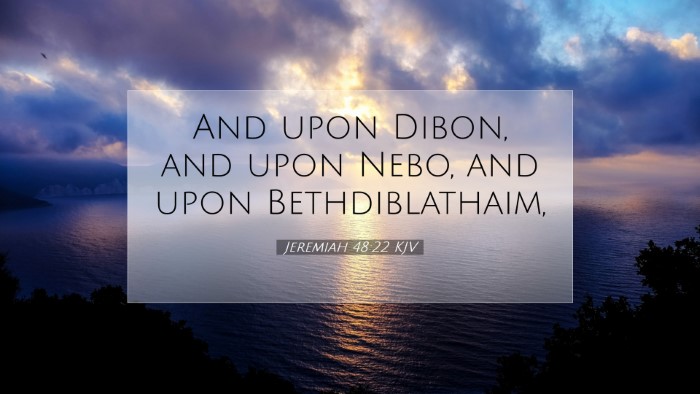Commentary on Jeremiah 48:22
Text of Jeremiah 48:22: “And upon Dibon, and upon Nebo, and upon Beth-diblathaim,”
Introduction
The prophecy of Jeremiah against Moab encompasses a significant warning against a nation that had once been a thorn in the side of Israel and a continual neighbor. Jeremiah 48:22 is a part of a series of announcements concerning the judgments pronounced on Moab. The inclusive nature of this verse indicates a broader pattern of destruction directed towards specific cities within Moab. This commentary draws from the insights of several public domain scholars, summarizing their thoughts to provide a relevant and stimulating analysis for pastors, students, theologians, and Bible scholars.
Historical Context
This passage finds its roots in the geopolitical tensions that existed in the ancient Near East. Moab, located east of the Jordan River, often positioned itself in opposition to Israel. The Moabites, descendants of Lot, were connected to Israel both culturally and historically, yet time and again, they became adversaries, influencing Israel’s descent into idolatry and sin. Understanding the historical context enriches our insight into Jeremiah's prophetic lamentations.
Specific Cities Mentioned
- Dibon: Once a thriving city, Dibon was significant for its salt and was an important site for trade. Its mention here signifies a targeted judgment, recognizing Dibon's former glory and its idolatrous practices, which would lead to its downfall.
- Nebo: Named after the Babylonian god of learning and the arts, Nebo represents the allure of pagan practices. The mention of Nebo indicates not only judgment for idolatry but also a call to accountability for Moab's spiritual failures.
- Beth-diblathaim: A city often associated with vineyards and fertility, Beth-diblathaim stands out as a reminder of the blessings God provided that were ultimately misused. Its destruction signals a severance from God’s blessing due to persistent disobedience.
Theological Insights
The verses surrounding Jeremiah 48:22 provide a clear indication of God’s sovereignty over nations. The passages show that no nation is beyond His reach when it comes to divine judgment. This assertion of sovereignty serves both as a warning and a profound theological truth that should resonate deeply within ecclesiastical circles.
Judgment and Mercy
Scholars like Matthew Henry emphasize that while God's judgment is apparent, His underlying motive is often rooted in a desire for repentance. God's righteous anger against Moab serves to highlight His intolerance for sin but simultaneously showcases His readiness to extend mercy should the people turn back to Him. This duality reflects pastoral themes of judgment balanced with grace.
Prophetic Imagery
Jeremiah employs vivid imagery to paint a portrait of desolation. The use of specific cities underscores the personal nature of the judgment, connecting the societal and spiritual failings of a nation with tangible repercussions. Adam Clarke points out how prophetic literature often includes shocking elements that aim to awaken the readers and listeners to the severe reality of divine disfavor.
Applications for Today
This passage invites contemporary readers, especially church leaders and theologians, to consider their own communities and nations. The call to reflection should investigate how idolatry manifests in our modern contexts. What practices compromise our faith today? Where do we see the blessings of God misused, and how might we be held accountable as leaders and as a church?
The Relevance of Prophetic Voices
The relevance of prophetic texts such as Jeremiah calls for earnest reflection in the modern church. As congregations and leaders grapple with cultural and moral challenges, the principles embedded in these ancient texts should inspire renewed commitment to holiness and discernment.
Encouragement to Do Good
Amid the somber warnings lie encouragements toward righteousness and an obedient lifestyle. Albert Barnes notes that true interpretation of scripture compels believers toward action; thus, the failures of Moab serve as life lessons for those on a spiritual journey. The call is, therefore, not just to condemn but to lead lives that reflect God’s character and righteousness.
Conclusion
Jeremiah 48:22 serves as a significant reminder of God’s sovereign control over history and nations. It calls for introspection and action, challenging us to seek God earnestly and align our lives with His righteousness. The reflections drawn from public domain commentaries aid in creating a rich tapestry of understanding, providing depth to the awareness of both the ancient context and its application for today's believers. As we engage with these themes, let us be mindful of our collective spiritual walk, persistent in not repeating the failures seen in Moab.


